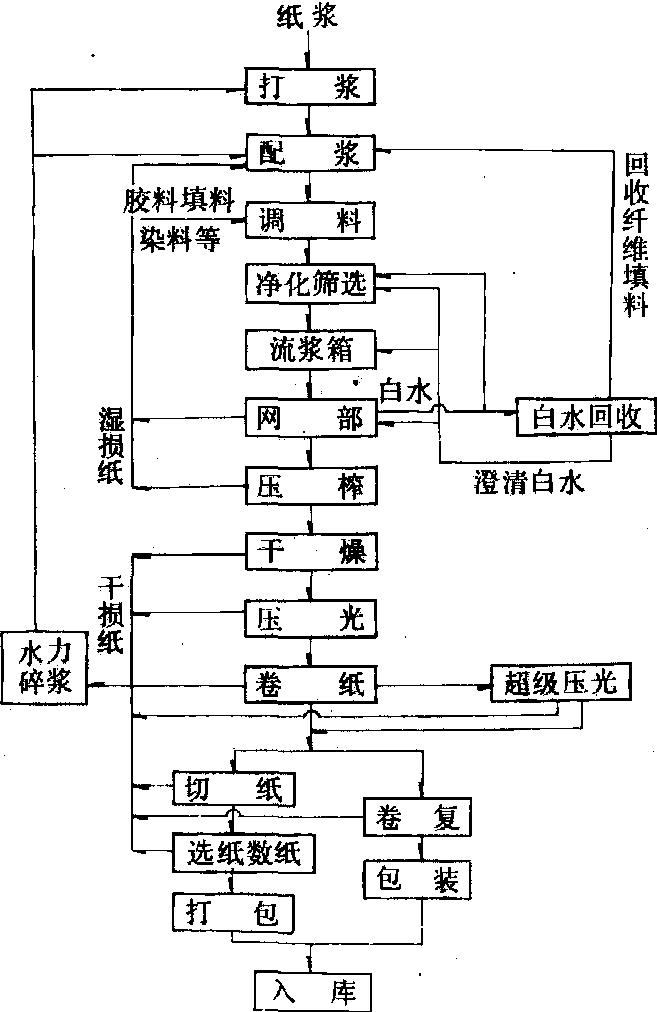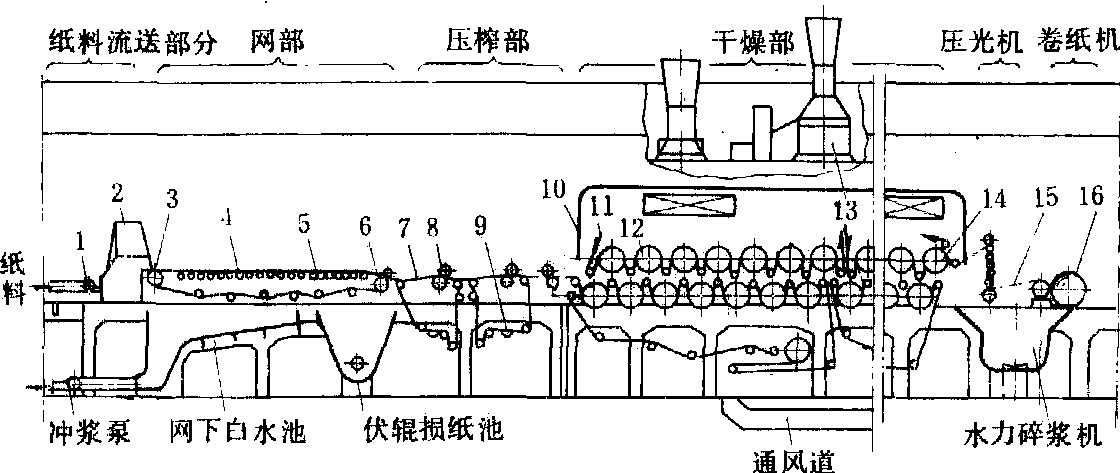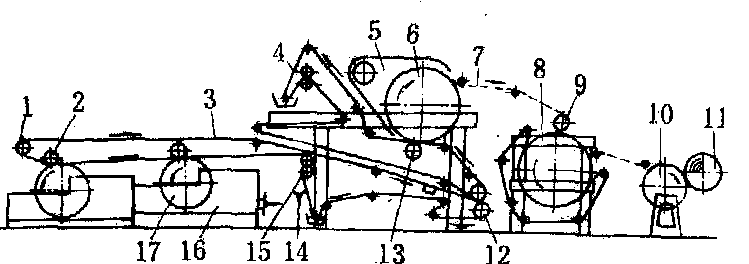纸和纸板的抄造paper and paperboardmaking
纸料通过水稀释,先经成型网滤水,纤维相互交织,形成均匀的湿纸页,再经压榨脱水、烘干成片状纤维制品(即纸和纸板)的方法。
造纸方法分为机械法和手工法。
机械造纸法 分为打浆、配浆、调料、净化、筛选、抄造、完成整理等几个工序(图1)。
打浆 用打浆设备处理纤维,使之适合于纸机抄造,并使成纸达到质量要求。打浆除对纤维疏解、揉搓、压渍以外,主要引起细胞壁产生位移和变形,初生壁和次生壁外层的破除,润胀,细纤维化和横向切断等作用。打浆后的纤维变得柔软可塑,比表面积增加,表面游离出大量羟基。当水分蒸发时,相邻纤维间的羟基形成氢键互相结合,这是纸张强度增加的主要原因。打浆使纤维之间的结合力增加,可以增加纸张的抗张强度、耐破度、耐折度、平滑度、紧度和收缩率,但撕裂度、不透明度和透气性降低。打浆也使纤维平均长度减小,以提高纸张匀度。添加合成树脂、改性淀粉或植物胶等干强助剂可以增加纤维结合力,提高纸张强度。打浆设备有打浆机、圆柱精浆机、锥形精浆机、圆盘磨浆机等。

图1 机械法造纸生产示意
配浆 为改善纸的性质,增加湿纸幅强度以适应纸机车速的要求,节约长纤维原料,降低成本,往往采用两种或两种以上不同的纸浆配合抄纸。
调料 向纸浆中加入施胶剂、填料、染料或化学助剂,以改善纸的性能。为提高纸的抗水性,向纸浆中加入施胶剂称为内部施胶,简称施胶。施胶后纸张的抗水性以施胶度表示。常用的施胶剂为松香胶,用碱皂化松香制得,经乳化稀释后使用。施胶量取决于要求的施胶度与施胶效率,多为0.5~2.0%(对绝干浆),并加入1.5~3倍的硫酸铝,使松香胶定着于纤维表面。其他施胶剂有石蜡松香胶、强化松香胶与中性施胶剂等。表面施胶是在半干的纸页表面涂上一薄层胶料,形成光滑的覆膜,可以提高纸的表面强度、平滑度、挺度及其他物理强度、抗水性和耐摩擦性等。为提高纸的白度、不透明度、平滑度以及吸油墨性,需向纸浆中加入滑石粉、碳酸钙、高岭土或二氧化钛等填料。但纸的强度略有降低,需控制填料用量。另外,生产有色纸时需添加染料染色。生产白纸时,往往添加少量染料进行调色,以便消除杂色,提高纸的白度。20世纪60年代以来,造纸工业较多地使用化学助剂,如干强助剂、湿强助剂、助留剂、助滤剂、防腐剂和消泡剂等,分别提高纸张干强度、湿强度、填料与细小纤维的留着率,改善纸料滤水性能,防止产生腐浆,以及消除泡沫。
净化与筛选 为提高纸张质量、降低尘埃度,纸料在抄纸前必须经过净化、筛选处理。净化是利用比重不同的原理从纸料中除去砂砾等杂质,主要设备为锥形除渣器。筛选是利用形状差异从纸料中除去浆团及纤维束,常用旋翼筛。
抄造 分纸的抄造和纸板抄造。❶纸的抄造是在造纸机上进行的。造纸机是多台设备组成的联动机,分湿部和干部。湿部包括流浆箱、网部和压榨部;干部包括干燥部、压光机、卷纸机。造纸机类型按网部形式可分为长网造纸机、圆网造纸机和夹网造纸机三大类;按烘缸数量又可分为单缸造纸机、双缸造纸机和多缸造纸机。长网造纸机生产效率高、产品质量好,质量要求高的纸都用长网造纸机(图2)抄造。纸料以0.3~1.0%的浓度由流浆箱流送上网,逐步滤水、沉积,形成组织均匀的湿纸页。网部设有案辊(或案板)、真空吸水箱、伏辊等成型脱水元件。湿纸页脱水至干度为14~22%时,从网面剥离送压榨部继续脱水。压榨部由若干组压榨辊组成,湿纸页由压榨毛毯承托,受压榨辊的挤压作用脱水至干度为30~40%或更高。在干燥部,湿纸页的两面轮流与用蒸汽加热的烘缸接触, 并被

图2 长网造纸机
1.浆流分布器; 2.流浆箱; 3.胸辊; 4.案辊; 5.真空吸水箱; 6.伏辊; 7.压榨毛毯; 8.压榨辊; 9.毛毯洗涤器; 10.通风罩; 11.干毯; 12.烘缸; 13.通风系统;
14.冷缸; 15.纸幅; 16.纸卷

图3 双圆网双烘缸造纸机
1.回头辊;2.伏辊;3.下毛毯;4.上毛毯;5.通风罩;6.第一烘缸; 7.纸幅;8.第二烘缸;9.光压辊;10.卷纸机;11.纸卷; 12.压榨辊;13.托辊;14.打毯器;
15.毛毯洗涤压榨辊;16.圆网槽; 17.圆网笼
❷纸板抄造。采用多层抄造,所用纸浆随纸板种类与使用要求而异,大多采用高得率浆。纸板的多层抄造分为间歇与连续两种方式。厚度1毫米以下,定量不超过800克/平方米的纸板,大多在连续式纸板机上抄造,由若干个圆网、长网、短网或夹网成型器分别抄造出若干单层湿纸页,并在一定条件下结合成为湿纸板,经预压榨初步脱水后,进入与造纸机类似的主压榨和多烘缸进一步脱水、干燥。厚度1毫米以上的纸板多采用与纤维板生产相似的间歇生产方式,即湿纸页在湿抄机的圆网或长网成型以后,缠绕在成型辊上至规定厚度割下,经液压机加压脱水后,进洞道式干燥室干燥。
完成整理 包括超级压光、复卷、切纸、选纸、数纸和打包等过程。根据需要,纸卷或分切成一定规格的平版纸,或复卷成一定规格的卷筒纸,包装入库。平滑度要求高的纸在分切或复卷前需经超级压光处理。
根据使用要求,某些纸或纸板还需进行各种方式加工,如涂料覆盖、浸渍吸收、变性加工、贴合加工以及机械成型等,加工后的制品称为加工纸或加工纸板。
除湿法造纸外,尚有干法造纸。它与湿法造纸的不同之处,是在纤维制备与纸幅成型中以空气代替水作为载体,并需向纸幅施加胶粘剂,使纤维粘结产生强度。干法造纸多限于抄制特殊纸种。
手工造纸法 中国的手工造纸法以稻草、麦草、竹子、檀皮、桑皮等为原料。经过选料、浸泡、发酵、蒸煮、洗浆、堆晒、碾浆、抄帘、压榨、焙干等一系列操作工序。抄帘工序是浆料在纸槽中用水稀释后利用竹帘捞纸。宣纸等传统手工纸,是中国特有的名贵书画文化用纸。